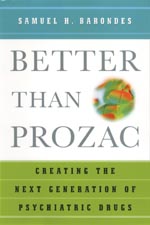
|
BOOKSHELFThe Mind Doctor Probes Prozac
There was a time when mental disorders such as depression and schizophrenia were thought to be too rare to merit close examination. Today, depression is known to be one of the most common diseases, and schizophrenia is known to strike one in 100 people. Millions rely on a variety of psychiatric drugs such as Prozac, Risperdal, Valium and Adderall to relieve the symptoms of these and other mental disorders. These drugs, all of which were discovered within the past 50 years, often have been hailed as triumphs of modern medicine. Psychiatrist and neuroscientist Samuel Barondes ’54, ’58 P&S frequently prescribes such drugs for his patients and has seen many beneficial results. Calling himself an “enthusiastic fan” of psychiatric drugs since he first began his psychiatry training in the 1960s, Barondes also is painfully aware of the drugs’ shortcomings and has established himself as an authority on the development of new ones. In his just-published book, Better Than Prozac: Creating the Next Generation of Psychiatric Drugs (Oxford University Press, $26), Barondes shares his firsthand experiences working with patients suffering from mental disorders and with the process of drug development. He also traces the history of psychiatric drugs and explains the role that accidents played in the discovery of their surprising therapeutic properties. For example, Barondes discusses the 1937 discovery that amphetamine, which was developed as a nasal decongestant, improved the school performance of children in a psychiatric hospital. This led to the use of amphetamine and a related drug, Ritalin, to treat children with attention deficit hyperactivity disorder. By considering the history of psychiatric drugs and their current application, Barondes points out the limitations and negative side effects of today’s drugs and shows how new research, especially in the field of genetics, will allow for a new generation of superior drugs. Better Than Prozac accomplishes the tough task of presenting a complex, scientific topic in an easy-to-read book that is as historical in its scope as it is medical. An appendix, which lists generic and corresponding product names for drugs as they appear in the United States and the United Kingdom, is helpful in clearing any confusion that may come with names such as methylphenidate, Metadate and Equasym, which essentially are the same drugs as the widely known Ritalin. Barondes also takes a critical look at major pharmaceutical companies and writes that many companies depend on a cycle of “chance and refinements” to make better versions of existing drugs rather than take on costly research efforts to develop novel medications. Noting that “only a few” psychiatric drugs are substantially better than the drugs discovered in the 1960s, Barondes believes that a new approach to drug design needs to be adopted.
The Jeanne and Sanford Robertson Professor and director of the Center for Neurobiology and Psychiatry at UC San Francisco, Barondes is a leading authority on the application of molecular biology to psychiatry. On July 15, he gave an hour-long presentation at the New York Academy of Sciences and discussed many of the topics covered in his book. Assuming the familiar role of lecturer, Barondes summarized evidence that inheritance of certain genetic variations increases the likelihood that people will develop specific patterns of mental symptoms and that identification of the genetic variations by studies of the DNA of people with particular disorders will lead to the creation of more effective psychiatric drugs. Barondes’ engagements on this tour included a lecture at the Smithsonian in Washington, D.C., on July 17, as well as interviews on radio shows such as NPR’s Fresh Air. Describing himself as a “loyal Columbia alumnus” who looks forward to his 50th reunion in 2004, Barondes says he owes a great deal to the University. He traces his passionate interest in the effects of brain chemicals on behavior to an undergraduate course in physiological psychology — a subject that was not yet part of the College curriculum but was offered by the School of General Studies. Barondes recently served as chair of the Board of Scientific Counselors of the National Institute of Mental Health and is a member of the Institute of Medicine. He is the author of more than 200 original research articles and two other books: Molecules and Mental Illness (Scientific American Library, 1993) and Mood Genes: Hunting for Origins of Mania and Depression (Oxford University Press, 1999), both of which were selected by the Dana Alliance for Brain Initiatives as among 35 “Great Brain Books.” P.K.
|
|
|||||||||||||||||||||||||||||||||||||||||||||||||||||||||||||

